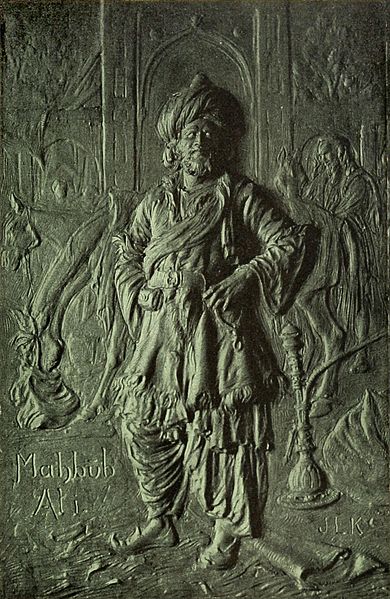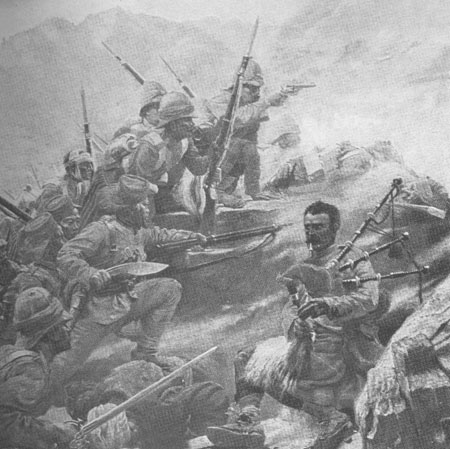Our fascination with the Gurkhas continues:
A Gurkha soldier who single-handedly defeated more than 30 Taliban fighters has been awarded the Conspicuous Gallantry Cross by the Queen…
In total he fired off 250 general purpose machine gun rounds, 180 SA80 rounds, six phosphorous grenades, six normal grenades, five underslung grenade launcher rounds and one Claymore mine.
He even used the base of a rocket launcher and a sandbag (it emptied when he picked it up). But not all elements of the legend were present and correct:
The only weapon he did not use was the traditional Kukri knife carried by Gurkhas because he did not have his with him at the time.
The great Indian Army Field Marshall Sam Manekshaw reckoned that if a man said he wasn’t afraid of dying he was either lying or a Gurkha (and he would have known). Naik (Corporal) Dipprasad Pun certainly makes it all sound rather matter-of-fact:
“I had so many of them around me that I thought I was definitely going to die so I thought I’d kill as many of them as I could before they killed me.”
I’ve just finished reading novelist John Masters’ memoir* of serving with a Gurkha regiment in India before the Second World War, Bugles and a Tiger. As its subtitle indicates, it’s very much A Personal Adventure. But it also manages to take in quite a bit of the history of British involvement with the Gurkhas, who, much like Scottish Highlanders, were co-opted by their better-resourced English opponent following valiant defeat (it was surely this sort of pragmatism that helped England become Top Nation for a period).
The book also provides a fascinating insight into the conflict of the time between the British Raj and Pashtun (or Pathan, as they were known then) tribesmen on the North-West Frontier. Despite a deal of respect being present between the sporadically warring sides, atrocities (as we call them nowadays) were committed by both as a matter of course:
On the government side, armourers removed the propellant charges from cartridges, replaced the low-explosive cordite with a high explosive, and then dropped the doctored clips about. The tribesman, always short of ammunition, picked them up, with bad results for his hand or face when he fired his treasure trove. We took few prisoners at any time, and very few indeed if there was no Political Officer about…
Something called ‘aerial proscription’ was used, which is echoed in the more discriminating drone attacks of today: following two warnings, ‘aircraft continuously patrol the area and attack with machine-guns and twenty-pound bombs any man or animal seen outside the safe enclave’.
For their part the Pathans mined and booby-trapped the roads with dud shells and stolen grenades. They never took prisoners but mutilated and beheaded any wounded or dead who fell into their hands. They took advantage of the rules [the British rules of engagement] to disguise themselves as peaceful passers-by, or as women. They simulated death and pounced on anyone foolish enough to relax his guard.
I won’t recount the forms of mutilation and torture conducted by the Pathans and the sort of retaliation that ensued as it’s pretty strong stuff. In any event, it was an often vicious conflict and one that featured combatants – Gurkhas and Pathans – who would surely rank as some of the strongest cards in a Top Trumps pack of history’s soldiers.
Some of the more flamboyant, too. Gurkha festivals featured a great number of bloody but decisive decapitations, using giant kukris, of a variety of blameless animals from buffaloes to chickens (along with, in the instance recounted by Masters, six marrows). It wasn’t all blood and gore though: formations of Gurkhas danced by moonlight, adorning their movements by the deft spinning of shining silver plates.
And then there were the peculiarities of the Pashtun warrior culture. Norman Stone, in his The Atlantic and Its Enemies, points out that the Ottoman term for a homosexual was derived from the word ‘Pashtun’. Masters informs us that ‘one of the most famous of Pathan songs…begins with the words, ‘There’s a boy across the river with a bottom like a peach, but, alas, I cannot swim’. He reflects:
I do not know why homosexuality should affect various peoples so differently, but there was something startlingly incongruous about the idea when associated with these fierce men, physically the hardest people on earth – they use sharp stones for toilet paper – and with the vast, grim jaggedness in which they live. A Pathan walks with the grace of a man-eating tiger, in long and unhurried strides, with a lift to them. He carries his head insolently up and and his shoulders carelessly back, but without any stiffness as from drilling. Pathans often have pale-blue eyes, untamed and a little terrifying, and the young men’s eyes are rimmed with kohl. Gritty dirt is ingrained in their skin, and the soles of their feet are like cracked leather. They often wear roses in their long hair…
I wonder do they still? Probably not something Corporal Pun had time to note.

* Serendipitously, a thoughtful review of one of his novels has just appeared here.












Synchronicity or what – I just read a John Masters novel and wrote about it on my blog. I think he’s v good.
Oh crumbs, sorry, I didn’t realise that link was to me and you’d seen it already. He’s a better writer than many today – but then that’s why I read Battered Penguins.
Yes, a great review of a writer who knew his craft (and, of course, had impressive first-hand experience of his subject matter).
My godfather had a kukri on his office desk and boy oh boy did I covet it as a kid, now you’ve shattered my dreams by telling me it was actually a gay knife 🙁
Extraordinary. One expects to find sodomy in violent all-male hierarchical structures (prisons, the navy (along with rum and the lash, of course)), but not necessarily songs about boys with bottoms like peaches.
Now I get it. The Pashtun Jihadi nutter who wanted to cut my throat on the Afghan-Pak border a couple of years ago just wanted to see my peach like bottom. I can’t blame him.